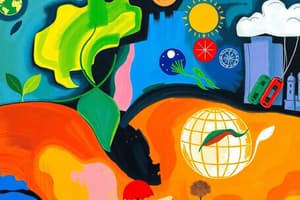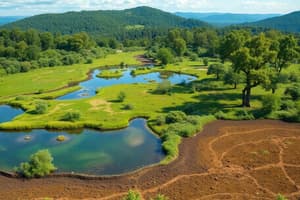Podcast
Questions and Answers
What is an ecological footprint?
What is an ecological footprint?
- The age of a person
- The total amount of food consumed by an individual
- The number of species in an area
- A measure of human impact on Earth's ecosystems (correct)
What does the term 'overshoot' refer to?
What does the term 'overshoot' refer to?
- The average lifespan of humans
- Exceeding Earth's carrying capacity for our species (correct)
- The total energy consumed by a nation
- The maximum speed of a vehicle
What is affluenza?
What is affluenza?
The failure of material goods to bring happiness to people who have the financial means to afford them.
Define economic growth.
Define economic growth.
What is ecolabelling?
What is ecolabelling?
What are aquifers?
What are aquifers?
What is fresh water?
What is fresh water?
What are sinkholes?
What are sinkholes?
What is an artesian aquifer?
What is an artesian aquifer?
Define groundwater.
Define groundwater.
What is surface water?
What is surface water?
What is a confined aquifer?
What is a confined aquifer?
What is irrigation?
What is irrigation?
What is a non-confined aquifer?
What is a non-confined aquifer?
What is consumptive use of water?
What is consumptive use of water?
What is non-consumptive use of water?
What is non-consumptive use of water?
Define the water table.
Define the water table.
What is a watershed?
What is a watershed?
What is a reservoir?
What is a reservoir?
What does aerobic mean?
What does aerobic mean?
What does anaerobic mean?
What does anaerobic mean?
What is coal?
What is coal?
Flashcards are hidden until you start studying
Study Notes
Ecological Concepts and Definitions
- Ecological Footprint: Represents human impact on ecosystems, typically measured in area of wilderness or natural capital consumed annually.
- Overshoot: Occurs when humanity exceeds Earth's long-term carrying capacity, potentially leading to ecological crashes or die-offs.
- Affluenza: Describes the inability of material goods to provide happiness for those who can afford them, often associated with consumer culture.
- Economic Growth: Refers to the increase in goods and services produced per capita over time, correlating with consumption levels.
Environmental Practices and Ethics
- Ecolabelling: A labeling process that informs consumers about the environmental impacts of products, allowing them to choose environmentally beneficial brands; it's a voluntary certification method.
- Environmental Ethics: The application of moral standards to environmental issues, focusing on the relationship between humanity and the environment.
Water Resources
- Aquifers: Underground layers of permeable rock that store or transmit groundwater, acting as vital water reservoirs.
- Fresh Water: Defined as water with low concentrations of dissolved salts, crucial for consumption and agriculture.
- Groundwater: Refers to water found underground in aquifers, important for ecological balance and human use.
- Surface Water: Water that resides on the Earth's surface, including rivers, lakes, and reservoirs.
Aquifer Types
- Artesian Aquifer: An underground layer where groundwater is under pressure, causing levels in wells to rise.
- Confined Aquifer: This aquifer is bounded by impermeable layers, resulting in pressurized water.
- Unconfined Aquifer: Lacks an impermeable upper layer, allowing easier recharge from surface water and resulting in lower water pressure.
Water Usage and Management
- Irrigation: The artificial application of water to support agriculture and landscaping, particularly in arid regions or during dry periods.
- Consumptive Use: Involves removing fresh water from available supplies without returning it, common in manufacturing and agriculture.
- Non-Consumptive Use: Involves the temporary removal of water for activities like hydroelectric power generation, permitting its return to the source.
- Water Table: Marks the upper limit of groundwater in an aquifer, indicating saturation levels.
- Watershed: The area of land that drains water into a specific river system, playing a crucial role in water management.
Other Relevant Terms
- Reservoir: An artificial lake or water body created by damming rivers, intended to store water for human use.
- Sinkholes: Formed by subsidence due to groundwater depletion, where the ground collapses, often found in limestone areas.
Environmental Processes
- Aerobic: Processes occurring in environments rich in oxygen, often essential for the survival of many organisms.
- Anaerobic: Processes that occur in low or no oxygen environments, such as the formation of fossil fuels from organic matter deep underwater.
Studying That Suits You
Use AI to generate personalized quizzes and flashcards to suit your learning preferences.




